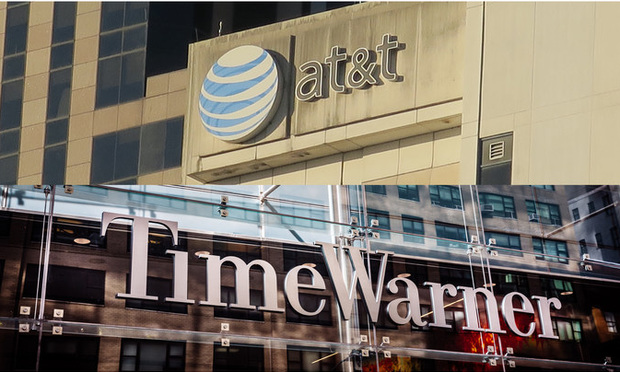It's Showtime: What to Watch at AT&T-Time Warner Antitrust Trial
The AT&T-Time Warner trial, set to begin Monday in Washington federal district court, is a blockbuster on many levels. Here's what to watch.
March 16, 2018 at 03:00 PM
7 minute read
The original version of this story was published on National Law Journal
 Photos: ALM/Shutterstock.com
Photos: ALM/Shutterstock.com
In a crusade to save its planned $85 billion takeover of Time Warner, AT&T has pressed a legal fight rife with drama befitting a deal that involves the provider of CNN news coverage and HBO's “Game of Thrones.”
Pointing to President Donald Trump's contempt for CNN coverage and public opposition to the deal itself, AT&T and Time Warner questioned early on whether political retribution was behind the U.S. Department of Justice's decision in November to block the acquisition.
The Justice Department, bringing further theater to the proceedings, has likened AT&T CEO Randall Stephenson to Captain Renault from the classic film “Casablanca,” comparing the executive's professed surprise over seeing the merger challenged to the duplicitous character's famous line, “I'm shocked, shocked to find that gambling is going on in here!”
Meanwhile, the Justice Department has pressed its case that AT&T would wield control over the Time Warner network to hinder rivals, resulting in higher prices for U.S. consumers. It's been decades since the government challenged a “vertical” merger—two companies that don't sit in the same space on the supply chain.
The two sides are scheduled to head to trial Monday in Washington federal district court. Here's what to watch.
“Not exactly a unicorn.”
For many antitrust experts, the Justice Department's challenge has upended a decades-long understanding of how regulators view vertical mergers.
In the rare cases where vertical mergers have raised concerns, regulators and companies have reached agreements that allow the deal to proceed through narrow, targeted terms to address antitrust concerns.
The idea, as one antitrust expert put it, has been “preserve the good while addressing specific concerns [regulators] have.” One recent example was the 2011 settlement in which the Justice Department allowed Comcast's acquisition of NBC Universal to proceed, with conditions meant to preserve competition.
The Justice Department has fought the notion that its challenge to the AT&T-Time Warner deal amounts to a significant departure from the recent history of antitrust enforcement.
In a recent opinion, Judge Richard Leon said DOJ lawyers have laid out a history of the department blocking similar deals. “So while it may, indeed, be a rare breed of horse, it is not exactly a unicorn,” Leon wrote.
The vertical nature of the deal leaves the Justice Department with a steeper hill to climb, as the merger would combine complementary businesses rather than eliminate a competitor.
How much will we hear about Trump?
Likely nothing at all—but not for lack of trying on AT&T's part.
In the buildup to trial, AT&T pushed to unearth any communications between the Justice Department and the White House over the company's proposed acquisition of Time Warner. AT&T pressed for that discovery based on the belief the company had been subjected to “selective enforcement”—singled out, essentially—based on the president's scorn for CNN and past statement that the deal would put “too much power in the hands of too few.”
Leon last month rejected AT&T's quest for communications between the Justice Department and the White House, ruling that the companies had failed to meet the “rigorous standard” for compelling discovery based on their belief that the merger challenge amounted to selective enforcement.
“[AT&T and Time Warner] have fallen far short of establishing that this enforcement action was selective—that is, that there 'exist persons similarly situated who have not been prosecuted,'” Leon wrote.
Lawyers took the ruling as a clear sign Leon was interested in sticking to the antitrust issues and steering clear of politics—an aspect of AT&T's defense that even some believers in the deal's legality viewed as a red herring.
 Makan Delrahim, assistant attorney general in the Antitrust Division of the U.S. Department of Justice. (2017) Credit: Diego M. Radzinschi/ NLJ
Makan Delrahim, assistant attorney general in the Antitrust Division of the U.S. Department of Justice. (2017) Credit: Diego M. Radzinschi/ NLJMeet the key players.
AT&T CEO Stephenson and the DOJ's antitrust chief, Makan Delrahim, have sparred with each other from afar in the buildup to trial. Stephenson has questioned Delrahim's motives in bringing the challenge and called attention to a 2016 interview in which Delrahim told a Canadian television station that he did not see the deal “as a major antitrust problem.” Delrahim joined the Trump administration from Brownstein Hyatt Farber Schreck's Los Angeles office, where he was a top lobbyist for tech and health care companies.
After speaking in person, the two have given differing recollections of their conversations. Delrahim said Stephenson asked whether the Justice Department would approve the deal if AT&T sold CNN. Stephenson has denied ever offering to sell the news network to win the Justice Department's approval.
A year removed from defeating Aetna Inc.'s proposed acquisition of Humana, Craig Conrath is returning as lead trial counsel for the Justice Department in the challenge to AT&T and Time Warner's deal. Conrath, a veteran litigator in the Antitrust Division, previously represented the government in an antitrust trial against American Express Co., which the Justice Department won in 2015 before losing on appeal.
AT&T is represented by O'Melveny & Myers partner Dan Petrocelli. A seasoned trial attorney, Petrocelli is not necessarily a household name within the antitrust bar but comes from a firm that is often called upon to defend deals. Staples Inc. chose Weil, Gotshal & Manges litigation partner Diane Sullivan for the defense of its proposed acquisition of Office Depot. (The FTC ultimately won a preliminary injunction, prompting Staples and Office Depot to scrap the deal.)
Notably, it was Leon who oversaw the Justice Department's settlement in 2011 with Comcast and NBC Universal. An appointee of former President George W. Bush, Leon has already put his mark on the case by refusing AT&T's quest for correspondence between the White House and the Justice Department. He said at a pretrial hearing Thursday the trial will last between six and eight weeks.
Two dollar amounts could feature prominently: 45 cents and $463M.
The Justice Department's expert witness, University of California, Berkeley, business and economics professor Carl Shapiro, has estimated the merger will bring a $463 million increase in costs to U.S. consumers. AT&T's response: That would amount to a monthly increase of 45 cents per customer.
AT&T's lawyers challenge the government's claim that the deal would raise costs—and they question whether the alleged per-customer increase of 45 cents justifies squelching the deal on antitrust grounds.
“The government's central claim in this case is that the merger of AT&T and Time Warner will lead to a theoretical 45 cent increase in the average monthly pay-TV bills for U.S. television consumers—an increase of 0.4 percent in an average monthly bill,” AT&T's lawyers wrote in a brief filed this week. “Apart from the remarkably small size of the alleged increase, there are several independent reasons why the evidence cannot support the government's claim.”
This content has been archived. It is available through our partners, LexisNexis® and Bloomberg Law.
To view this content, please continue to their sites.
Not a Lexis Subscriber?
Subscribe Now
Not a Bloomberg Law Subscriber?
Subscribe Now
NOT FOR REPRINT
© 2025 ALM Global, LLC, All Rights Reserved. Request academic re-use from www.copyright.com. All other uses, submit a request to [email protected]. For more information visit Asset & Logo Licensing.
You Might Like
View All

‘Ripe for SCOTUS’: Ruling Creates Circuit Split on NLRB’s Expanded Monetary Remedies

Trump Seeks Pause of Supreme Court Cases, Disavows DOJ Stance on Voting Rights Act

Energy Lawyers Field Client Questions as Trump Issues Executive Orders on Industry Funding, Oversight
6 minute readTrending Stories
- 1Uber Files RICO Suit Against Plaintiff-Side Firms Alleging Fraudulent Injury Claims
- 2The Law Firm Disrupted: Scrutinizing the Elephant More Than the Mouse
- 3Inherent Diminished Value Damages Unavailable to 3rd-Party Claimants, Court Says
- 4Pa. Defense Firm Sued by Client Over Ex-Eagles Player's $43.5M Med Mal Win
- 5Losses Mount at Morris Manning, but Departing Ex-Chair Stays Bullish About His Old Firm's Future
Who Got The Work
J. Brugh Lower of Gibbons has entered an appearance for industrial equipment supplier Devco Corporation in a pending trademark infringement lawsuit. The suit, accusing the defendant of selling knock-off Graco products, was filed Dec. 18 in New Jersey District Court by Rivkin Radler on behalf of Graco Inc. and Graco Minnesota. The case, assigned to U.S. District Judge Zahid N. Quraishi, is 3:24-cv-11294, Graco Inc. et al v. Devco Corporation.
Who Got The Work
Rebecca Maller-Stein and Kent A. Yalowitz of Arnold & Porter Kaye Scholer have entered their appearances for Hanaco Venture Capital and its executives, Lior Prosor and David Frankel, in a pending securities lawsuit. The action, filed on Dec. 24 in New York Southern District Court by Zell, Aron & Co. on behalf of Goldeneye Advisors, accuses the defendants of negligently and fraudulently managing the plaintiff's $1 million investment. The case, assigned to U.S. District Judge Vernon S. Broderick, is 1:24-cv-09918, Goldeneye Advisors, LLC v. Hanaco Venture Capital, Ltd. et al.
Who Got The Work
Attorneys from A&O Shearman has stepped in as defense counsel for Toronto-Dominion Bank and other defendants in a pending securities class action. The suit, filed Dec. 11 in New York Southern District Court by Bleichmar Fonti & Auld, accuses the defendants of concealing the bank's 'pervasive' deficiencies in regards to its compliance with the Bank Secrecy Act and the quality of its anti-money laundering controls. The case, assigned to U.S. District Judge Arun Subramanian, is 1:24-cv-09445, Gonzalez v. The Toronto-Dominion Bank et al.
Who Got The Work
Crown Castle International, a Pennsylvania company providing shared communications infrastructure, has turned to Luke D. Wolf of Gordon Rees Scully Mansukhani to fend off a pending breach-of-contract lawsuit. The court action, filed Nov. 25 in Michigan Eastern District Court by Hooper Hathaway PC on behalf of The Town Residences LLC, accuses Crown Castle of failing to transfer approximately $30,000 in utility payments from T-Mobile in breach of a roof-top lease and assignment agreement. The case, assigned to U.S. District Judge Susan K. Declercq, is 2:24-cv-13131, The Town Residences LLC v. T-Mobile US, Inc. et al.
Who Got The Work
Wilfred P. Coronato and Daniel M. Schwartz of McCarter & English have stepped in as defense counsel to Electrolux Home Products Inc. in a pending product liability lawsuit. The court action, filed Nov. 26 in New York Eastern District Court by Poulos Lopiccolo PC and Nagel Rice LLP on behalf of David Stern, alleges that the defendant's refrigerators’ drawers and shelving repeatedly break and fall apart within months after purchase. The case, assigned to U.S. District Judge Joan M. Azrack, is 2:24-cv-08204, Stern v. Electrolux Home Products, Inc.
Featured Firms
Law Offices of Gary Martin Hays & Associates, P.C.
(470) 294-1674
Law Offices of Mark E. Salomone
(857) 444-6468
Smith & Hassler
(713) 739-1250








